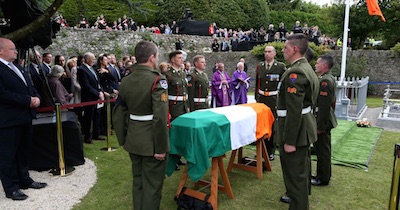
A state funeral for 1916 martyr Thomas Kent took place yesterday in a re-interment openly stage-managed by the Dublin government to boost its nationalist credentials.
Thousands attended the ceremony on Friday at his home in Castlelyons, County Cork to pay their respects to one of the 16 patriots executed in the aftermath of the 1916 Rising.
Applause broke through the crowd when the funeral cortege arrived at the church near where Kent was born and brought up. Kent’s extended family, including two of his three elderly nieces, were among those who attended the service.
Sometimes known as “The Forgotten Volunteer”, Thomas Kent was one of only two executed outside Dublin. He was shot by firing squad at the Military Detention Barracks in Cork, his body buried in a shallow grave within its walls and recently recovered from that spot.
But in a political stroke, Fine Gael leader Enda Kenny chose to deliver the oration over his new grave, and claimed the 26 County Army as ‘Oglaigh na hEireann’, the inheritors of the mantle of the 1916 rebels.
There was no reference to the corruption scandals besetting his party when he told mourners that Ireland needed people who believed in their community, their country and in putting others before themselves.
He said: “Today in our time, we are not called upon to die for our country but even now, even with our freedom, in our own and very different time, we need men and women who believe. We need men and women who believe in community, country, in putting others before themselves.
“This includes the members of our Defence Forces - Oglaigh na hEireann - who continue their time-honoured tradition of service of their country, both at home and abroad, and it is fitting that they have brought Thomas here on his final journey.”
The events of May 2nd, 1916, which led to Kent becoming only one of two men (along with Roger Casement in London) to be executed outside Dublin after the Easter Rising were recalled.
Kent and his brothers fought a party of RIC (Royal Irish Constabulary) who called to their family home as part of a round-up of nationalists in the wake of the Rising, and only surrendered when they ran out of ammunition.
A historian for the 26 County military delivered a eulogy for Kent in which he described him as “someone who is very much in the present”.
“Today, members of Oglaigh na hEireann, the Irish Defence Forces, will render the military honours that were denied him 99 years ago,” he said.
HISTORY HIJACKERS
The ceremony took place less than 24 hours after a row erupted between Sinn Fein and the leader of Kenny’s coalition partners, Tanaiste Joan Burton of the Labour Party, who lashed out at republicans for trying to “hijack” the history of the country.
The tense ‘commemoration war’ over the 1916 centenary celebrations was again exposed at the launch of Labour’s Munster 1916 exhibition when Burton accused Sinn Fein of attempting to claim ownership of the ideals of Republicanism and the 1916 revolutionary period.
She claimed that many in Sinn Fein cannot even bring themselves to use the name of the state, which she said was ‘the Republic of Ireland’, although the Irish constitution refers to the state as simply ‘Ireland’ or ‘Eire’.
Burton also made clear that the 1916 commemorations would be an election issue. “Labour will realise our country’s potential - an Ireland better for all,” she said. “That would be a truly fitting way to build on the Commemorations and the 1916 legacy.”
Gerry Adams, who also attended the re-interment of Thomas Kent on Friday, said her remarks were “schizophrenic”.
“The Tanaiste’s attitude is marked by a shallow and wholly self-serving approach to Irish history,” he said.
“The men and women of 1916, including Thomas Kent who we will re-inter here in Cork tomorrow, engaged directly in revolutionary armed activity against British rule in Ireland.
“Unlike Joan Burton, Sinn Fein makes no apology for this. We salute their stand and will not attempt to re-write history to fit narrow party political objectives or to misrepresent the facts.
“Joan Burton and the Labour Party leadership have nothing in common with the men and women of 1916 nor any intention of promoting the ideals of freedom and equality for which many gave their lives in 1916 and after.
“Joan Burton knows that commemorating 1916 raises a myriad of contradictions for her own party and it’s actions in government, not least their partitionist attitude and failure live up to the egalitarian ideals of the Proclamation.”
![[Irish Republican News]](https://republican-news.org/graphics/title_gifs/rn.gif)
![[Irish Republican News]](https://republican-news.org/graphics/title_gifs/harp.gif)

